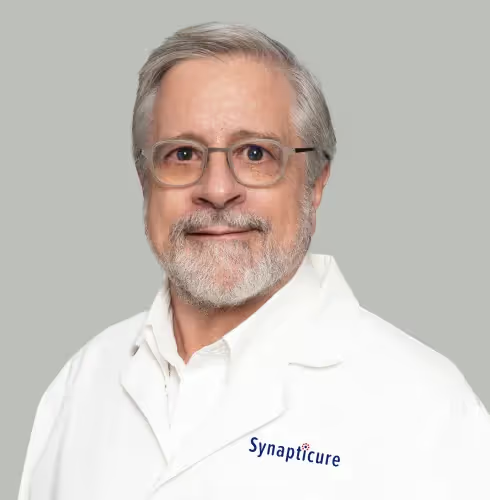Being diagnosed with Parkinson’s Disease can be an overwhelming and isolating experience. The journey ahead may seem daunting. At Synapticure, we're here to guide you through it. We understand the uncertainty and fear that often accompany a new diagnosis, which is why we're dedicated to providing personalized care and support every step of the way.
In this article, we've compiled a list of essential things to know when facing a Parkinson’s diagnosis. From understanding the condition to navigating the healthcare system, we're committed to empowering you with knowledge and resources tailored to your unique journey. If you're ready to learn more, don't hesitate to reach out to us at (855) 255-5917. Your journey with Parkinson's doesn't have to be faced alone—let us be your care partners.
You are not alone
Parkinson's disease (PD) is the second most common age-related neurodegenerative disease in North America. More than 10 million people are living with PD in the world. A study published in 2022, “Incidence of Parkinson's disease in North America”, found 90,000 new diagnoses of PD each year1. The incidence of PD is higher in males and increases with age once over 65.
Parkinson’s disease is different for everyone
PD is unique to the individual. Some patients have tremors. Others have more issues with walking. Some patients struggle with nonmotor symptoms more than their motor symptoms. Symptoms vary daily. If you are sick, stressed, or fatigued, you will have more symptoms. It’s important to practice self-compassion and avoid comparison as each person has a different journey. If you work with Synapticure, we will provide each person with an individualized care plan tailored to their symptoms and needs. If you already have a doctor, we will work in partnership with them to ensure you are covered at every angle.
You may have had symptoms of PD years to decades before the diagnosis
We know that specific symptoms can precede the PD diagnosis years to decades before diagnosis. These can include constipation, decreased sense of smell, acting out dreams during sleep, depression, anxiety, and cognitive changes.
Remember, it's common for Parkinson's symptoms to manifest subtly and progress gradually over time, often going unnoticed until diagnosis. So, if you didn't recognize these signs earlier, know that you're not alone, and it's never too late to seek support and take steps toward managing your health.
PD affects other systems in your body
Your fight or flight system, known as the autonomic nervous system, is affected by Parkinson’s disease. The main symptom of this is often constipation. However, it can also manifest in difficulty with sexual function, bladder control, and blood pressure fluctuations. If you’ve noticed changes in your symptoms, contact your health professional so they can provide timely interventions and improved management of your symptoms.
When it comes to PD, it’s important to add a specialist to your team like a Movement Disorder Specialist. They are expertly trained to provide and understand diagnosis, treatment optimization, non-motor symptom recognition, advanced treatment guidance, and familiarity with recent research developments. Having a Movement Disorders specialist on your team has been shown to result in better care, and earlier and proactive treatment and planning in response to disease symptoms.
Mood disorders are common in Parkinson’s disease
In Parkinson’s, nonmotor symptoms exist as a result of complications from the disease. When it comes to Parkinson’s disease, there is more than a lack of dopamine. Other neurotransmitters like Serotonin and Norepinephrine are also affected which can lead to symptoms like fatigue, apathy, depression, and anxiety. There is symptom overlap between depression and PD which can lead to depression being under-diagnosed. In fact, 40% of PD patients have apathy. Studies have found that anxiety in various forms may be present in up to 40% of people with PD. It is not uncommon to have more symptoms occur during an “off” period. Please discuss this with your health care team as treatment with counseling and medication can help.
If you’re experiencing these symptoms, contact your health professional to understand what options may be available to support your journey. At Synapticure, we understand the intricate relationship between Parkinson’s disease and mood disorders, which is why we have a dedicated team of mental health professionals with decades of experience in managing neurodegenerative conditions. They can provide tailored support and interventions to help you navigate any challenges you may encounter.
Hallucinations and delusions can develop
Hallucinations and delusions in Parkinson’s disease are also known as PD psychosis. It can occur in 20% of patients without cognitive impairment. The rate is higher in patients with PD-associated dementia. Other risk factors that increase the risk of psychosis include mood disorders, poor sleep, and impaired vision. The most common symptom is visual hallucinations, which typically manifest as people or animals. Most individuals have insight that these are not real in the beginning. It is important to inform your care team if this occurs as many PD medications can worsen symptoms of psychosis.
Speech and swallow changes are common
Many patients with Parkinson’s disease start having difficulty with a soft voice early in the course of their disease. Some may also trip over their words causing a stutter-like effect. As the disease progresses, you can develop more difficulty with swallowing food, water, and medications. This can put one at risk of choking, aspiration, and pneumonia. It is important to recognize changes early as swallow therapy and LOUD (Lee Silverman Voice Therapy) can help strengthen those muscles and improve function. Synapticure can connect you to speech language therapists. If you’re not ready for speech therapy, singing also helps strengthen your voice. There are virtual sing-alongs that you can join too!
Certain medications can worsen Parkinson’s disease
Parkinson’s disease motor symptoms are due to low dopamine in the nervous system. Many medications on the market can lower dopamine further, worsening symptoms. Anti-nausea medications like Phenergan (promethazine), Compazine (Prochlorperazine), and Reglan (metoclopramide) all work by blocking dopamine. There are also mental health medications like antipsychotic medications that are used to help mood and hallucinations/delusions that also block dopamine. The American Parkinson’s Disease Association has a helpful list of medications to avoid based on which medications you are taking for your Parkinson’s disease symptoms.
Exercise helps delay progression
While there is no cure for Parkinson’s disease, we do know that exercise helps delay progression2. Based on the Parkinson’s Outcomes project from the Parkinson’s Foundation, current recommendations are for 150 minutes of moderate to intense exercise per week. This does not solely need to be aerobic but can include strength training, stretching, and balance exercises. It is important to practice exercise safely. For instance, exercise when you are “on” your medications. If you have balance issues, having someone with you is important to avoid falls.
If you are new to exercise, it is advisable to start with a physical therapist who specializes in Parkinson’s disease or is certified in BIG physical therapy. Remember to pace yourself and modify exercise over time. There are a variety of options for PD patients to do this at home or in person. You may even want to check out if your local YMCA offers Rock Steady Boxing or Pedaling for Parkinson’s Disease.
It is important to build your support network
Everyone needs support. Work on building your care team with additional providers like a movement disorder neurologist, counselor, and physical/occupational/speech therapists. Consider joining an exercise class, sing-along, or support group either virtually or in person. Do not be afraid to ask questions. Many individuals have been in your shoes and want to help. There are great resources out there for patients and caregivers through the Michael J. Fox Foundation, Parkinson’s Foundation, American Parkinson’s Disease Association, PD Avengers, Davis Phinney Foundation, and more.
1 Willis et al. “Incidence of Parkinson's disease in North America”. NPJ Parkinson’s Disease 8, Article number: 170 (2022).
2 Alberts JL, Rosenfeldt AB. The Universal Prescription for Parkinson's Disease: Exercise. J Parkinsons Dis. 2020;10(s1):S21-S27. doi: 10.3233/JPD-202100. PMID: 32925109; PMCID: PMC7592674.
About the Author
Dr. Ferluga, a neurology specialist, developed and directed movement disorder programs at prestigious medical centers before pivoting to teleneurology with Synapticure, focusing on holistic care for Parkinson’s and Huntington’s patients.











.png)


